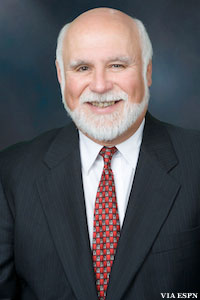
For eight years, two news organizations possessed an audio tape that screamed something was horrifically wrong -- that Bernie Fine, an assistant basketball coach for Syracuse University, might have sexually abused a teenage boy. Yet, for all that time, neither ESPN nor the Post-Standard newspaper of Syracuse reported the tape to anyone, authorities included.
The immediate question is, why not? If the media are rightly aghast that Penn State football coach Joe Paterno didn't take enough action with his knowledge of Jerry Sandusky's alleged molestations, shouldn't news outlets be held to the same standard regarding Bernie Fine?
On the tape, Bobby Davis, a former ball boy for the Syracuse basketball team, has a conversation with Fine's wife, Laurie, which provides a strong indication she knew about the alleged molestations.
"I know everything that went on, you know," Laurie Fine says on the tape. "I know everything that went on with him. … Bernie has issues, maybe that he's not aware of, but he has issues." Asked by Davis if he's the only person Bernie Fine sexually abused, Laurie Fine says, "No … I think there might have been others."
Paterno was fired for not taking enough action in 2002 when he failed to notify authorities of alleged sexual abuse by Sandusky, a former assistant coach under him. The same questions of inaction are now being raised regarding ESPN and the Post-Standard, both of which were at least aware of Bernie Fine's alleged misconduct as early as 2003.
Even if they didn't have enough corroborating evidence to publish a story, shouldn't they have turned the tape over to law enforcement authorities?
Isn't there an obligation to do so when the alleged victim is a minor? Especially when you possess an audio tape on which the alleged abuser's wife says, "I think there might have been others?"
As in the case of Paterno and Penn State, the timeline is important.
On Nov. 27, both ESPN and the Post-Standard released the audio taped phone conversation between Davis and Laurie Fine. The conversation reportedly took place in 2002. Shortly thereafter, Davis provided the Post-Standard with a copy of the tape. He provided ESPN with a copy in 2003.
According to reports, beginning in 2002 the Post-Standard conducted a six-month investigation into the allegations, which included an interview with Laurie Fine. She confirmed her conversation with Davis, but denied some of the remarks on the tape. The paper chose not to publish a story because it could not verify the allegations. The Post-Standard reportedly did not go to the police with the tape.

ESPN has a similar reason for not going ahead with the story eight years ago. According to Vince Doria (pictured at left), ESPN's director of news, Davis brought the allegations to ESPN's attention in 2003 and provided three people he said would corroborate his story. "Those sources either told us that was not the case or would not talk with us," Doria said in an online discussion released by ESPN.
Doria said that while the audio recording "was clearly a damning tape in terms of [Laurie Fine's] characterization of her husband," she "never directly acknowledged to have witnessed any of these actions first-hand." Because of that and the fact that ESPN did not generate the tape and could not verify its validity -- the network says it did not have a baseline of Laurie Fine's voice to compare it with in order to authenticate it -- "we felt in 2003 that the material we had did not meet the standards for reporting the story," Doria said.
ESPN says it did not notify authorities of the allegations because Davis had gone to the Syracuse police in 2002 and been told the statute of limitations had expired. (In New York, the statute of limitations is five years.) "So we were fully under the impression that the police had been made aware of the story and had decided not to pursue it," Doria said.
Fast forward eight years. Prompted by the Penn State abuse scandal, a friend of Davis' came forward to corroborate his story one day after Paterno was fired. During the next two weeks, two more men accused Bernie Fine of molesting them. The second prompted federal prosecutors to obtain a warrant to search Fine's house. On Nov. 27, the Post-Standard and ESPN, having obtained a baseline of Laurie Fine's voice that allowed them to verify the tape's authentication, felt they had enough information to publish stories about the 2002 phone conversation between Davis and Fine.
Now ESPN and the Post-Standard find themselves in a situation eerily similar to the one that got Paterno fired and earned him a visceral beating from the media -- including ESPN.
"This wasn't a case of Paterno choosing to ignore allegations of booster payments to a player or improper grade changes by a professor," ESPN.com's Mark Schlabach wrote the day of Paterno's firing. "Paterno's inaction allegedly involved one of the most heinous crimes a person can commit -- the rape of a child. While Paterno has not been accused of legal wrongdoing -- authorities have said he cooperated during the investigation – he is guilty of gross indifference, if nothing else. Morally, Paterno should have done more …"

There is certainly a separation between journalistic responsibility and moral obligation. In the case of Bernie Fine, neither ESPN nor the Post-Standard felt they had enough information to publish a story that would effectively change a man's life forever. There was no eye witness, as there was to Sandusky's alleged abuse, so to their credit neither news outlet went forward with a story based on unsubstantiated allegations.
Still, for eight years they sat on the tape while Bernie Fine roamed free.
The Post-Standard at least interviewed Laurie Fine in 2003 about the content of the tape. ESPN did not and only attempted to authenticate its validity within the last 10 days. Asked why it took eight years to attempt to authenticate the tape, an ESPN spokesman replied, "Confirming that it was her wasn't [enough] to make us report [the story]."
In his online discussion of the Syracuse story, Doria states: "All journalists could be asking themselves this very same question: What role should journalists play in providing information that may or may not have been reported? It's complex and something we must continue to evaluate."
Yes, a distinction must be made between the standard for reporting a story and the moral obligation to report a potential sex crime against minors. Still, if we, the media, are going to hold the likes of Joe Paterno to a certain standard, then we'd better hold ourselves up to the same standard. We may be a part of the "media," but we're people first.
Related Stories:
-- Why Sports And Sex Abuse Too Often Mix
-- Red Sox Sex Abuse Scandal From Years Ago Still Inflicts Pain Today
-- Out Of Darkness: Penn State Scandal May Bring A New Era For Whistleblowers
-- Team Identity: Why Penn State Students Rallied Behind Paterno




